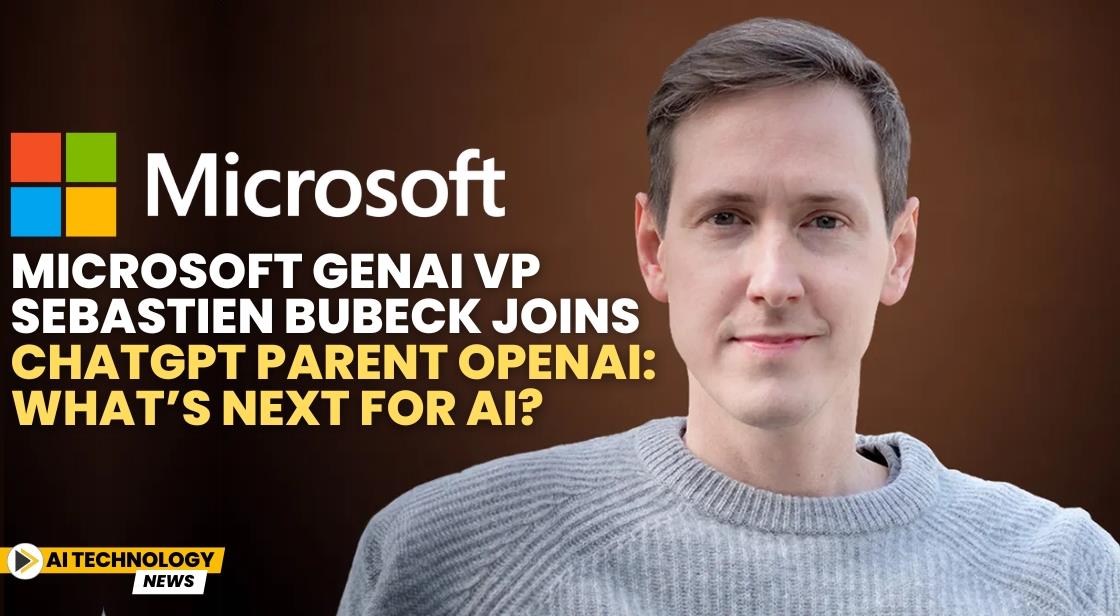Microsoft GenAI VP Sebastien Bubeck Joins ChatGPT parent OpenAI: What’s Next for AI?

News Synopsis
Sebastien Bubeck, the vice president of Generative AI (GenAI) research at Microsoft, has made waves in the tech industry with his decision to leave the company and join OpenAI, the parent company of ChatGPT.
Bubeck's departure is significant, given his pivotal role in driving Microsoft's advancements in artificial intelligence (AI). While his exact role at OpenAI has not yet been revealed, his decision to work on developing artificial general intelligence (AGI) has drawn attention across the tech landscape.
Microsoft Confirms Bubeck's Departure with Optimism for Continued Collaboration
In a statement confirming his exit, a Microsoft spokesperson said, "Sebastien has decided to leave Microsoft to further his work toward developing AGI," according to a report. Despite Bubeck's move, Microsoft remains optimistic about its ongoing collaboration with him through his future work at OpenAI.
This statement suggests that the two companies, already closely aligned in AI research, may continue to share resources and insights despite the personnel changes. As of now, Bubeck has not personally commented on his departure.
Sebastien Bubeck’s Work on Microsoft’s Phi LLMs to Continue Despite His Exit
Bubeck’s decision to leave Microsoft comes after notable contributions to the company’s Phi LLMs (Large Language Models) project, which focuses on creating smaller, more efficient language models compared to traditional large-scale AI models.
While Bubeck was a key figure in this research, reports suggest that his coauthors and colleagues at Microsoft will continue the project, pushing forward with the development of these more efficient models. This indicates that while his departure is impactful, Microsoft’s AI research efforts remain robust and will continue to progress.
A Wave of Departures at OpenAI Amid Structural Changes
Interestingly, Bubeck’s move follows a series of notable exits from OpenAI itself. In September, Mira Murati, OpenAI's Chief Technology Officer (CTO), also departed after many years with the company. While the departure of key figures at OpenAI has prompted speculation, OpenAI’s CEO Sam Altman has firmly denied that these changes are part of any broader restructuring plan within the company. Despite these high-level departures, OpenAI remains a dominant player in the AI industry, particularly in the development of AGI.
Strains in the Microsoft-OpenAI Relationship?
Bubeck’s decision to join OpenAI comes at a time when there are signs of strain between Microsoft and OpenAI, despite their long-standing partnership. There have been reports suggesting that OpenAI is seeking greater independence from Microsoft’s Azure cloud services.
OpenAI is believed to be diversifying its cloud infrastructure by leasing data centers from Oracle in Texas, indicating a strategic move to reduce its reliance on Microsoft. Additionally, OpenAI recently raised a staggering $6.6 billion in one of the largest venture capital rounds in U.S. history, further fueling its ambitions for the future.
What Sebastien Bubeck’s Move Means for the Future of AI and AGI
With Bubeck now joining OpenAI at a time of significant transformation for both companies, the implications for the future of AI and AGI are considerable. Bubeck’s expertise in AI research, particularly in developing efficient language models, will likely accelerate OpenAI’s already ambitious projects. Meanwhile, Microsoft, despite the loss of a key figure, continues to build on its AI foundations, particularly through its Azure cloud platform and collaborations with industry partners.
As the race toward AGI—an advanced form of AI capable of performing any intellectual task that a human can—continues to heat up, Bubeck’s move could signify a new phase of development in this area. With OpenAI at the forefront of AGI research and Microsoft remaining a leader in cloud-based AI services, this shift in leadership could reshape the competitive landscape of AI in the years to come.
Conclusion:
Sebastien Bubeck's departure from Microsoft to join OpenAI comes at a pivotal moment in the development of artificial intelligence. His move signifies a potential acceleration in OpenAI’s ambitious goals, particularly in the realm of artificial general intelligence (AGI), where Bubeck’s expertise is expected to make a significant impact. Although his departure is notable, Microsoft’s AI research efforts will continue unabated, particularly in the development of efficient language models like Phi LLMs.
At the same time, Bubeck’s transition highlights the evolving relationship between Microsoft and OpenAI. Despite signs of strain in their cloud partnership, both organizations remain influential players in the global AI landscape, each with its own set of resources and innovations to contribute.
As the race toward AGI intensifies, the collaboration and competition between these tech giants could shape the future of AI. Bubeck’s move underscores the increasing dynamism in the AI sector, with leaders, resources, and strategic partnerships constantly shifting to push the boundaries of technological innovation.









